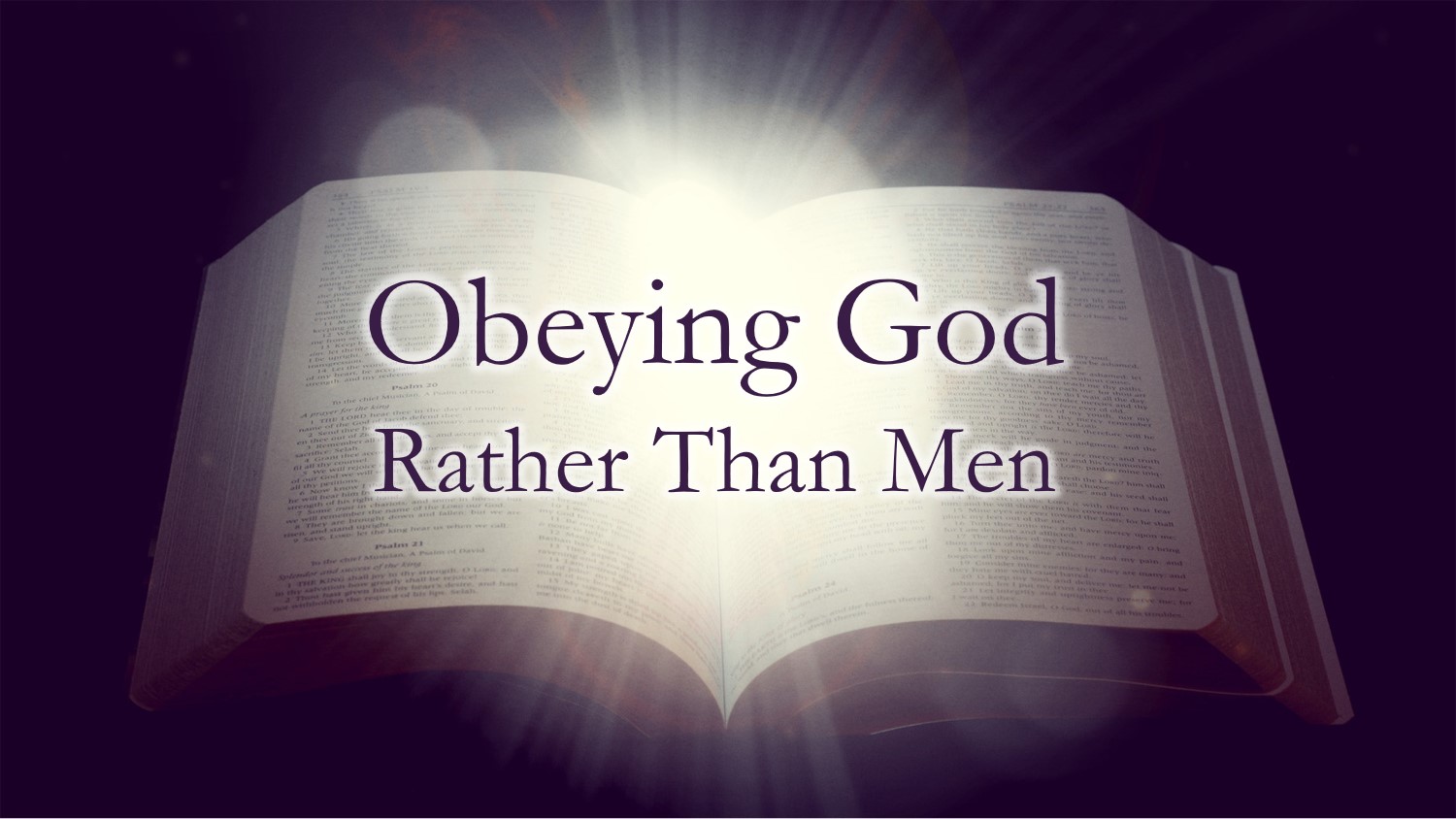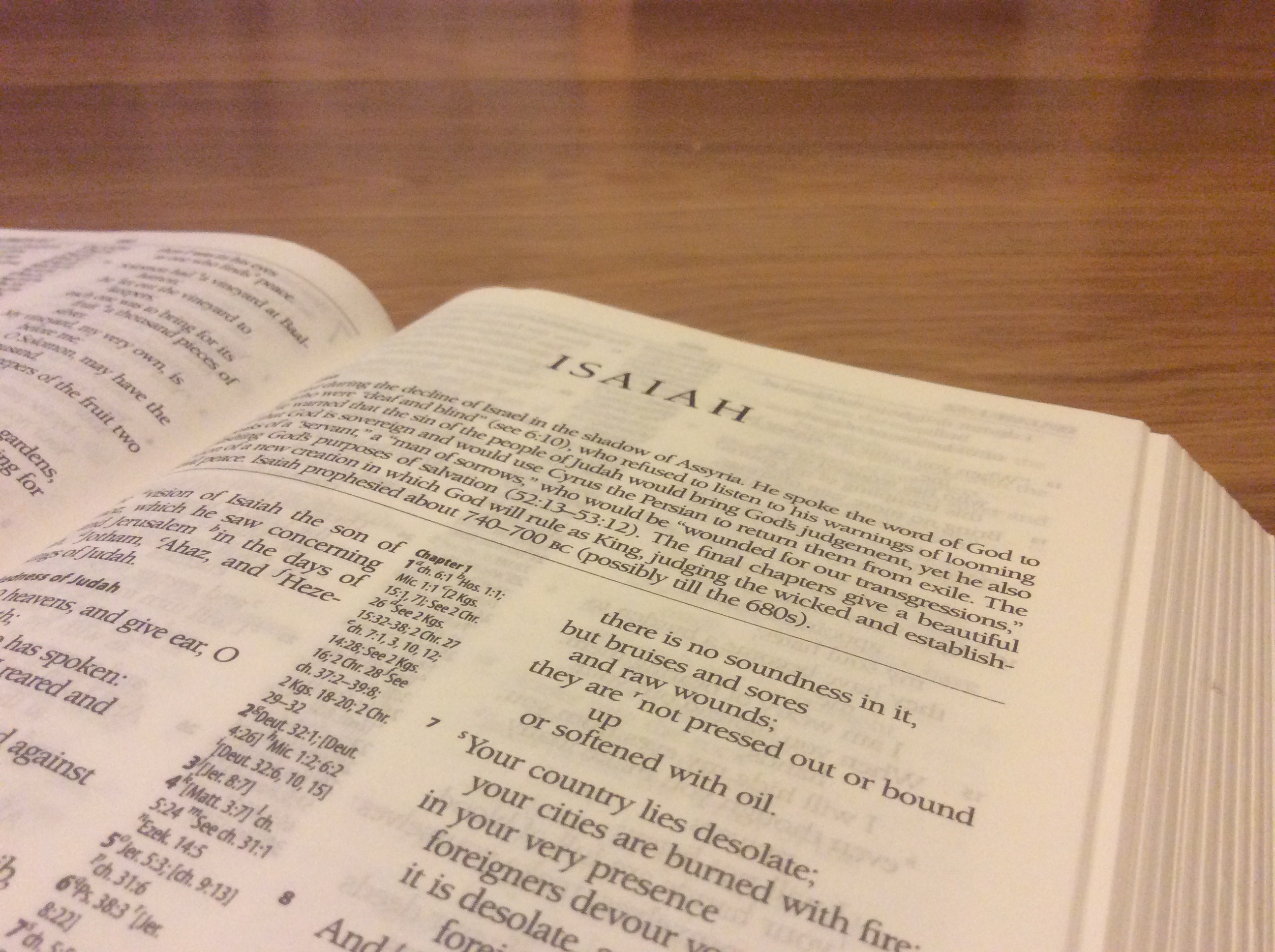Blog
M. W. Bassford
Psalm 93
Wednesday, January 20, 2021
The Lord assumes His seat as King,
And He is clothed with majesty;
He girds Himself with matchless strength
And puts on might for all to see.
Indeed, the world is firmly fixed,
You hold it fast by Your decree;
Your throne is founded from of old,
And You are from eternity.
The floods have lifted up, O Lord,
The floods have lifted up their voice;
The floods lift up their pounding waves,
And mighty breakers all rejoice.
How mighty is the Lord on high!
Your will enforces each command;
Your holiness befits Your house,
And through the ages it will stand.
Suggested tune: OLD 100TH
(“All People That On Earth Do Dwell”)
Obeying God Rather Than Men
Tuesday, January 19, 2021
In our Bible reading this week, we are going to encounter the story of the final confrontation between the apostles and the Sanhedrin. The Council demands that the apostles stop preaching Jesus, but, as Acts 5:29 famously records, they reply, “We must obey God rather than men.”
In these words, we find the reason why totalitarian governments never like Christians. Their authority cannot be total as long as we acknowledge an authority greater than theirs. However, I also have seen brethren claim that they are allowed to resist our government in defense of their inalienable Constitutional rights.
What are we to make of this tangle? Clearly, there are times when we must put the kingdom of God above the kingdoms of earth. Equally clearly, there are times when we must submit to the laws of the earthly governments where we reside. However, there also are edge cases between these two extremes. How do we know what to do when? Let’s look to the text of Acts 5 for some guiding principles as we try to figure out when to obey God rather than men.
First, we must SUBMIT AS MUCH AS POSSIBLE. We see the apostles exemplifying this in Acts 5:25-26. After the angel frees them from prison, they return to the temple and begin preaching to the crowds again. The temple guards show up to re-arrest them, but they quickly realize that they might touch off a riot if they do. Instead, the guards nicely ask the apostles to come with them.
The apostles are not idiots. They know they might be going to their deaths, and they can get away with refusing for now, thanks to the crowds. However, rather than resisting, they do as the guards ask. Even under extreme circumstances, they continue to submit to earthly authority.
This principle should guide our interactions with the government too. Romans 12 tells us to be at peace with everyone so far as it is possible with us. Romans 13 commands us to submit to the government and pay our taxes. As a rule, Christians must obey earthly law.
Sadly, in our country these days, a lot of people seem to think that they only have to obey the laws they like, and this is true on both left and right. I spend a fair amount of time on gun-enthusiast boards these days, and there are lots of people who talk about their plans to disobey the federal firearm regulations they see coming.
That kind of disobedience is not for us. It does not matter if we think the taxes are too high. We pay them. It does not matter if we think a law is foolish, oppressive, or unjust. We obey it. It does not matter if we think government officials are a bunch of crooks and jackbooted thugs. We honor them. Human justifications are never a reason to disobey human governments. We obey them because we obey God.
Second, we OBJECT ONLY TO CONTRADICTION. Look at the contradiction that appears in Acts 5:17-21, 27-28. The angel tells them that they have to proclaim the whole message of life, but the high priest says they can’t preach about Jesus anymore. It is impossible for the apostles to honor both God’s instructions and the high priest’s instructions. Something’s got to give, and the apostles choose to disobey the high priest.
There are a couple of things worth noting here. First, only the law of God allows the Christian to disobey the government. I’ve seen a lot of brethren recently arguing that they can ignore the government sometimes because of the Constitution. Well, yes and no. We do have the right to challenge some governmental action on the basis of our Constitutional rights, much like Paul used his rights as a Roman citizen.
However, the way we do that is through a lawsuit, not through defiance of the law. If we sue and the courts find against us, or if courts already have decided the issue, we must abide by that result. In our system of government, the courts, not the people, interpret the Constitution. To refuse to obey the government because of what we think our Constitutional rights are is not righteous. It is sin and lawlessness.
Second, a direct contradiction must exist. It is not enough that the government is putting our tax dollars toward an evil end, or that the government is doing something we think is ungodly. Instead, for Acts 5:29 to apply, the government must forbid us to do something God requires or require us to do something God forbids.
For instance, let’s say that over the next couple of years, the federal government repeals the Hyde Amendment, so that federal funds can be used to fund abortions once more. In fact, let’s say that the government gets into the abortion business itself and starts opening and running its own abortion clinics.
I would not be at all happy about that. I believe that the Bible teaches that abortion is evil. However, so long as the government is not actively demanding that Christians have or perform abortions, the conditions of Acts 5:29 have not been met. We must continue to honor the government.
Finally, if we resist, we must RESIST RIGHTEOUSLY. Consider the apostles’ example in Acts 5:40-42. Even though they have done nothing wrong, the Sanhedrin has them beaten because they preached Jesus. In response, they do two things. First, they rejoice that they suffered on account of Jesus. Second, they continue to preach.
Here, we see that the Bible limits both the circumstances under which we can resist and the means that we can use. This is actually a Bible-authority issue. One of the great themes of the New Testament is that Christians don’t fight back against oppressive governments. When Peter draws his sword to defend Jesus in the garden, Jesus tells him to put it up. When Saul of Tarsus was ravaging the church, no one fought back against him. It is never, ever godly for Christians to rebel.
In fact, rather than trying to defend our comfort through force of arms, we should rejoice in our suffering. If we are persecuted for the cause of Christ, that is nothing more than happened to Jesus Himself, and it shows that we are walking in His footsteps. If we were of the world, the world would love us back. The more the world hates us, the more it shows that we are imitating Him.
Instead, rather than trying to use evil to overcome evil, rather than meeting violence with violence, we must overcome evil with good. The only weapon that early Christians wielded was the sword of the Spirit—the word of God. They blessed their enemies and prayed for their persecutors. They suffered and continued to love.
Though this strategy seems weak in worldly eyes, it is very powerful. In the first century, truth and love prevailed over persecution. The more the enemies of the gospel tried to stamp it out, the more it spread. They lost because they were fighting against God. If we will follow Him today, He will be with us too, and none of our enemies, no matter who they are, will be able to overcome us.
Preaching the Whole Message
Monday, January 18, 2021
Acts 5 contains a fairly convoluted series of events. As with Acts 4, the climax of the chapter is a confrontation between the apostles and the Sanhedrin. However, the path to the confrontation is a little more winding.
In 5:17-18, the apostles are arrested. However, in 5:19-24, an angel rescues them from prison so they can continue proclaiming the gospel. In 5:25-26, they are asked nicely to appear before the Council, and only then does the famous showdown take place.
Of particular note, though, is the angel’s instruction to the imprisoned apostles in 5:20. He tells them, “Go, stand and speak to the people in the temple the whole message of life.” Don’t leave anything out, even the parts that might get you arrested and killed. Preach the whole thing.
Still today, daring to proclaim the whole gospel is divisive, and it even can be dangerous. There are millions of people who do not want to hear the bad news about their sin, even if it is followed by the good news about salvation through Christ. All of us have friends, neighbors, and even brethren in that boat. There are many churches in which repeating the plain teaching of Jesus in Matthew 19:1-9 will not find favor.
However, preaching the whole message, especially the unpopular parts, has great value. First, it demonstrates our integrity and commitment to God. A few years back, I was talking with a progressive friend about my opposition to the practice of homosexuality. As many progressives do in that area, he resorted to the conservatives-are-hypocrites argument and informed me that we didn’t honor Jesus’ teaching on divorce. “Well, actually. . .” I replied.
Declaring the whole counsel of God might open us to charges of being extremists, legalists, or fanatics. However, it insulates us from accusations of hypocrisy. When we say we honor the word of God, we can prove that we mean it.
That kind of strong stand might awaken hatred from others (which, according to John 15:18-19, is nothing more than disciples can expect), but crucially, it does not expose us to contempt. Everyone knows the difference between people of principle and those who will abandon the ideals they claim whenever convenient. The latter are easily dismissed; the former cannot be. Even on the cross, Jesus’ righteousness overcame the shame of His death.
Second, faithfully repeating the whole gospel finds favor with God. Discipleship is not about convenience, either for us or others. It is about obeying our Lord, even when it is difficult, even when we don’t want to, even when obedience costs us things we hold dear. When we surrender our will to God’s, we reveal that we have the mind of Christ.
However, just as Jesus was highly exalted when He humbled Himself to the point of death, so too will we be exalted. When we confess Him before men, He will confess us before His Father. When we honor God, He will honor us. Nobody will lose their souls for showing too much respect for God’s word, but danger lies in editing the message to suit our preferences.
A Second "Follow Me"
Friday, January 15, 2021
When we read the account of John 21:1-19, we can’t help but be struck by the similarity between the narrative of the chapter and the accounts recorded in Matthew 4:18-22 and Luke 5:1-11. Both stories take place by the Sea of Galilee. Both involve an enormous catch of fish. Both conclude with a call from Jesus to Simon Peter: “Follow Me!”
Bible skeptics love to seize on these similarities and claim they are different versions of the same poorly remembered (extremely poorly remembered, given the miraculous catch) event. Those poor dumb disciples! It’s a good thing the skeptics know much better than the disciples what happened, even though they were eyewitnesses and the skeptics aren’t, and the skeptics live thousands of years later.
Of course, the Evangelists didn’t get their facts wrong. Instead, they have recorded a display of the wisdom of Jesus. He is the One driving events both in Luke 5 and John 21, and the narrative in both cases is so similar because He makes it so for the benefit of His disciples, in particular, for the benefit of Peter.
Consider Peter’s emotional ups and downs over the past couple of months. During the Triumphal Entry, he, along with the rest of Jesus’ disciples, is convinced that Jesus is about to re-establish God’s kingdom on earth. On the night of Jesus’ betrayal, he proudly declares his willingness to die for and with his Lord.
However, when he begins to fight, Jesus tells him to put up his sword. In fear and confusion, he denies his Master three times, as He had told him he would. He watches the One he thought was the Messiah die a painful, shameful, public death.
And then, against all expectations, on Sunday morning the tomb is empty. Jesus is indeed the Christ, though a different kind of Christ than Peter had ever imagined He would be. It is this Christ, mocked, beaten, crucified, and raised, who tells Peter for a second time, “Follow Me.” The words and setting are the same, but what Peter hears is very different.
So too for us. As any of us who have been disciples for any length of time know, discipleship has its twists and turns. Sometimes we ride high spiritually; sometimes we struggle. Sometimes we blow it as completely as Peter blew it.
Through it all, though, unless we give up entirely, we continue to learn. We understand better what it means to follow Jesus, to die to ourselves as He died that we too might attain to the resurrection from the dead.
Even more encouragingly, through it all, Jesus continues to invite us to follow. In His vast mercy, He gives us all second chances, like He gave Peter a second chance, and third, fourth, and fifth chances—as many as necessary. Our understanding will be different, but His call always is the same: “Follow Me,” until the day when no more following is necessary because we have joined Him where all of us always will be.
Being a Light in a Dark Place
Thursday, January 14, 2021
During Charlie’s address to the congregation last week, he revealed that our theme for the year is going to be “Be the Light”. It’s only natural that throughout a year as difficult as 2020 was, our thoughts would tend to turn inward. However, the elders want us to remember that we aren’t supposed to be lamps inside a bushel basket, keeping all that light for ourselves. Instead, we’re supposed to shine before others, so that they can see our good works and glorify God.
However, right now, that poses a problem for us. Like a houseguest who has overstayed his welcome, coronavirus has kept right on from 2020 into 2021. In fact, we’ve been forced to a truncated schedule of services because of the risk of infection. Add to that all the political turmoil and unrest, and our 2020 theme might seem as remote as the dark side of the moon!
What I’d like to talk about this morning, then, is three simple things that all of us can do, right now, this week, to shine. Let’s consider what it means to be a light in a dark place.
The first thing we all can do is ENCOURAGE AN ABSENT MEMBER. Here, let’s look at Hebrews 10:24-25. Across the brotherhood and even within the congregation, there’s been a lot of angst about this passage. If we cancel services, or if we isolate ourselves at home because we’re medically vulnerable, are we forsaking the assembly?
To be honest, though, I think that whole debate is missing the point. This text isn’t about assembling for the sake of assembling. It’s about assembling in order to encourage one another and stir up love and good works. There’s a real temptation here for us to get self-righteous, to start judging hearts because we think the only reason someone wouldn’t come is lack of faith, and we’re better than they are, right?
Brethren, rather than judging one another, we need to be concerned for one another and look for ways to help. All these people who haven’t been here, whyever they haven’t been here, are missing out on a serious amount of one-anothering. They haven’t been stirred up. They haven’t been encouraged by being around other Christians. I think our tech team has done wonders in working on our livestream, but watching church from home just isn’t the same as assembling with the saints.
In short, these Christians are people who have been on spiritual starvation rations, and that shouldn’t stir our contempt. It should stir our compassion. These are people who have been isolated from the love of the congregation, and we should want to help.
Here’s what I want to suggest, then. This week sometime, go through the directory, find someone who hasn’t been here, and call or write them. Don’t passive-aggressively hint that they really ought to be coming back to services, those slackers! Talk to them the way you would want to be talked to if you were in their shoes. Tell them that you love them, that you miss them, that they matter to you. Ask how you can help. I guarantee you that the impact you have will be far out of proportion to the effort you expend.
Second, let’s HONOR THE ELDERS. Look at 1 Thessalonians 5:12-13. Let me tell you, brethren: after the 2020 they had and the 2021 they’re having, they richly deserve that recognition!
Part of the problem, I think, is that a good eldership is like a duck. Let me explain. You ever gone out to a park or something and watched ducks swim around on a pond? From the shore, it looks effortless, doesn’t it? They just go sailing serenely along. Underneath the water, though, it’s a different story. Those webbed feet are going like crazy!
That’s how it is with elders. You sometimes hear Christians croaking, “What are the elders doing? The elders aren’t doing anything!” They only say that, though, because they don’t see all the activity that’s going on under the surface.
Brethren, I think that if we knew how many hours the elders have spent this year trying to lead this church wisely, trying to balance our physical health against our spiritual welfare, we would be humbled by the depths of their self-sacrifice for us. They’ve been watching the disease data every day. They’ve been studying guidelines. They’ve been texting one another and calling one another and emailing one another and meeting with one another. They’ve been fielding calls from members, sometimes not very respectful ones. They’ve been praying. They’ve been tossing and turning, trying to figure out the right answers when nobody has the foggiest idea what the right answers are.
Through it all, they’ve done amazingly well. I can’t point to a single decision they’ve made in the past year and say, “That was just dumb.” All of us owe these good men a tremendous debt.
In return for all that, our respect is nothing more than they deserve. Let’s consider, then, three quick ways we can show them love and honor. First, we can defer to their judgments. Even if we don’t agree with them about something, we must acknowledge that God set them over the church, not us. We also might want to consider the possibility that six men chosen for their wisdom are right and we aren’t.
Second, let’s let them know that we appreciate them. This week sometime, send one of them a card or a text that isn’t bringing a problem to them or complaining about something, but is just saying “Thank you.” We could stand to do a lot more of that all the time, honestly. Third, let’s make a practice of praying for them, asking God’s blessing on them in a detailed way. Every one of them would tell you that they need it!
Finally, let’s PREPARE TO DO GOOD. Consider the example of 1 Corinthians 16:1-2. We’re very familiar with this text because it tells us how to give to the Lord’s work, but there’s more going on here than merely that. We use this text as authority for indefinite collections, but that’s not what this one was. Instead, by contributing week by week, the Corinthians were preparing for Paul to come and take their cumulative contribution to help the needy saints in Jerusalem. They couldn’t send that collection right then, but they were getting ready for the time when they could send it.
In addition to all of its other unwelcome traits, I think most of us found 2020 to be a spiritually frustrating year. There were lots of things we wanted to do for the Lord and couldn’t. We canceled potlucks, singings, Bible studies, and get-togethers. In a year when we couldn’t even have all our own people assembled at once, it seemed pointless to invite visitors to our assemblies.
At some point in the future, though, all those restrictions will no longer be in place. Like the Corinthians, we need to get ready now for what we want to do then. I’ve already had some of you talking to me about things that you want to try in the future, and I think that’s great! Let’s all of us start thinking that way. Think about that devotional you want to host. Think about that neighbor you want to invite. Plan for how you want to do it, then, when you have opportunity, follow through.


